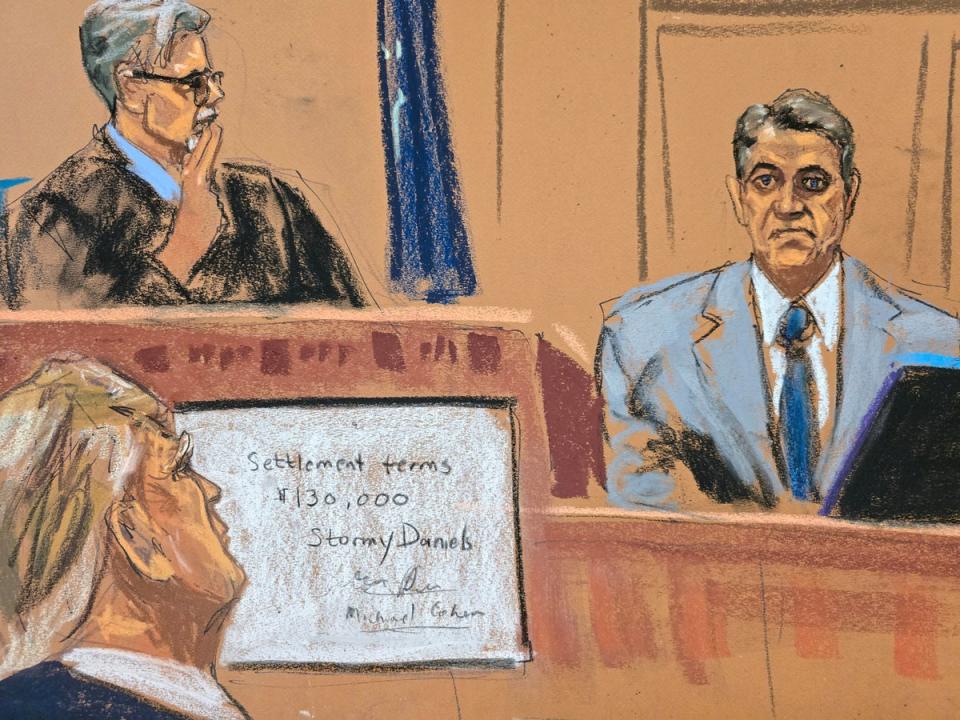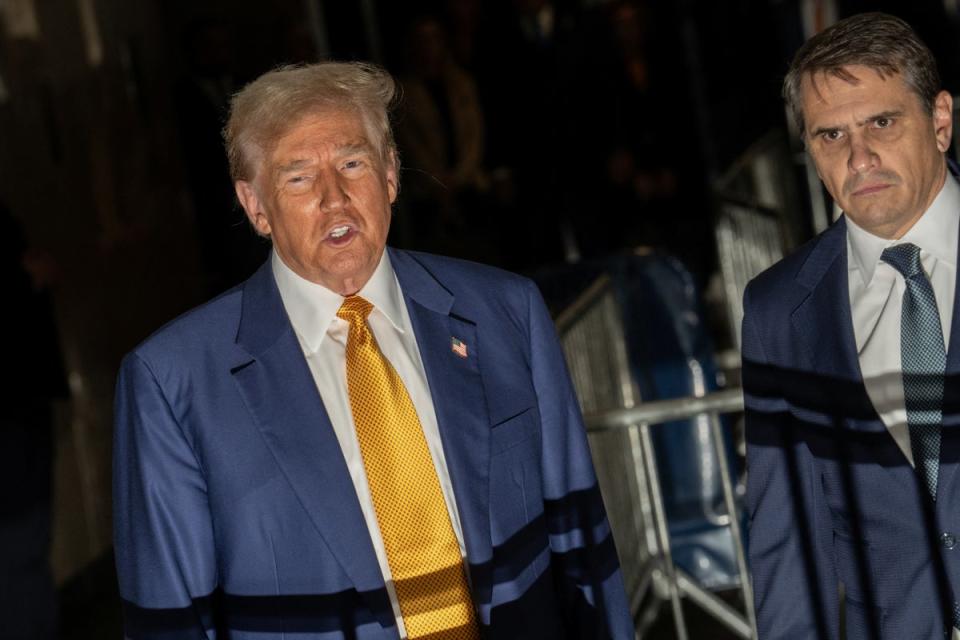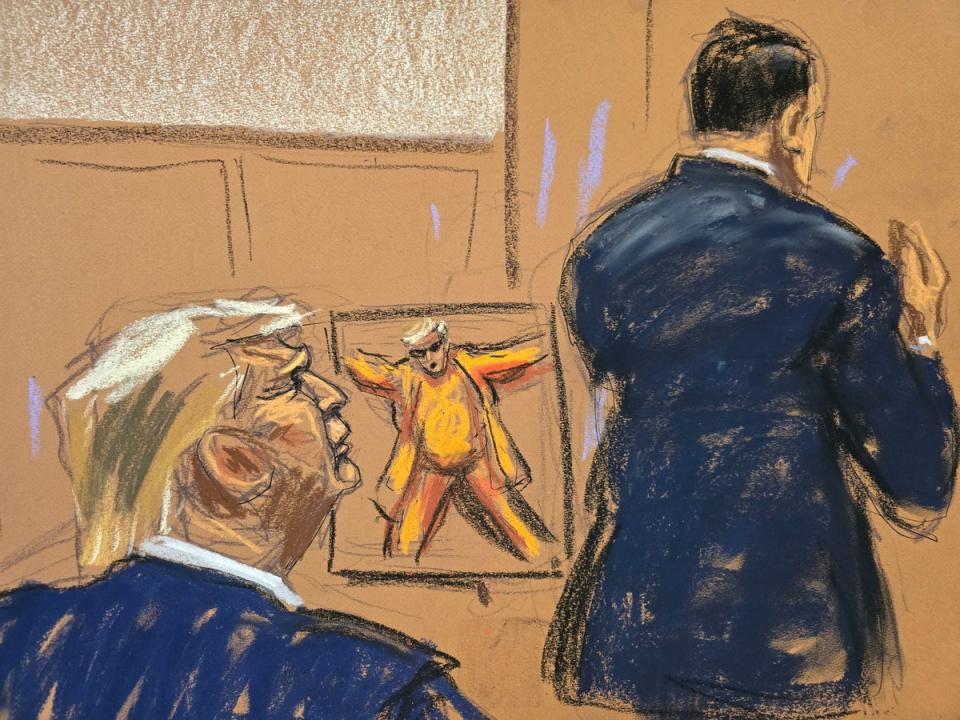Stormy Daniels lawyer thought Michael Cohen ‘was going to kill himself’ when Trump didn’t give him role in White House
The attorney who negotiated Stormy Daniels’ $130,000 hush money payment with Michael Cohen thought Donald Trump’s then-attorney was going to “kill himself” after learning he had been left out of a job in the White House after the 2016 presidential election.
In his second day of testimony in the former president’s hush money trial in Manhattan on Thursday, Keith Davidson told jurors that Cohen was distraught by mid-December 2016.
“I thought he was going to kill himself,” Mr Davidson said.
Earlier, Mr Davidson told the court that Cohen had voiced disbelief that Mr Trump was not offering him a role in his administration, after he allegedly helped him win the election by suppressing negative stories about his alleged affairs with women.
“Jesus Christ, can you believe I’m not going to Washington?” Mr Davidson recalled Cohen saying.
“I’ve saved that guy’s ass so many times you don’t even know. That guy’s not even paying the $130,000 back.”
Mr Davidson testified that Cohen had believed he would be in the running to serve as Mr Trump’s White House chief of staff or US attorney general.
Text messages and emails shown in court between Mr Davidson and Cohen through 2016 and into the first two years of the Trump administration detailed negotiations that would keep the adult film star’s story of an alleged affair with Mr Trump out of the press during his campaign.
That transaction is at the centre of the criminal case against the former president, who is charged with 34 counts of falsifying business records for allegedly reimbursing Cohen the $130,000 payments and labelling them as legal expenses.

Two days of questioning from Manhattan prosecutors put Mr Davidson on the spot to confirm that he believes Mr Trump was funding Cohen to pay off Ms Daniels – and that his sophisticated and deceptive “technically true” statements were intended to obscure the truth.
But cross-examination from Mr Trump’s defence attorney Emil Bove appeared to try to undermine his credibility by strongly suggesting that Mr Davidson was extorting people on behalf of his clients, running through a string of high-profile tabloid incidents in the 2010s.
Mr Bove repeatedly asked whether Mr Davidson “extracted” money from celebrities embroiled in high-profile tabloid stories at the time.
“We asserted that there was tortious activity committed and there were valid settlements executed,” Mr Davidson said.
“Look, we’re both lawyers,” Mr Bove fired back. “I’m not here to play lawyer games with you.”
“I am giving you truthful answers, sir,” Mr Davidson said. “If you’re not here to play legal games, then don’t say ‘extract.’”

In January 2018, two days before The Wall Street Journal published details of the so-called hush money scheme involving Ms Daniels, Cohen sent a message to Mr Davidson to “write a strong denial,” according to messages shown in court.
Asked by Manhattan Assistant District Attorney Joshua Steinglass what Cohen meant by “denial,” Mr Davidson said: “Everything.”
“Including the sexual encounter with Donald Trump?” Mr Steinglass asked.
“Yes,” Mr Davidson said.
Ms Daniels’ statement – which Mr Trump recently shared on his Truth Social as supposed evidence intended to exonerate him of wrongdoing in this case – denied allegations of a “sexual and/or romantic affair” and stated that her “involvement with Donald Trump was limited to a few public appearances and nothing more”.
The hush money payments “are completely false,” the statement said.
Mr Davidson, who wrote the statement, told the court it was still “technically true”.
“I think that this is a tactic that is oftentimes used in the oftentimes cat and mouse interactions between publicists, attorneys and the press, and an extremely strict reading of this denial would technically be true,” he testified on Thursday.

“I don’t think anyone had ever alleged that any interaction between she and Donald Trump is romantic,” he said.
As for the “sexual” part of that statement, that falls under the “and/or,” he said.
A subsequent statement from 30 January 2018 – which Mr Davidson also claimed was “technically true” – said that Ms Daniels was “not denying the affair because I was paid ‘hush money’ as has been reported in overseas owned tabloids” but because “it never happened”.
“I don’t think anyone had ever alleged there was a relationship,” Mr Davidson said in his testimony. “I believe a relationship is an ongoing interaction.”
In his testimony earlier this week, Mr Davidson told the court that he assumed that the money wired by Cohen to his client was coming from Mr Trump, or from “some corporate affiliation thereof”.
But, in February 2018, Cohen demanded a statement from Mr Davidson’s client to send to then-CNN host Chris Cuomo that explicitly stated that the money came only from Cohen.
“I think he was under some fire and wanted some validation or corroboration,” Mr Davidson said on Thursday.
He also claimed that Cohen threatened to sue him “many times”
“He can be a very aggressive guy, aggressive in his pursuits to protect his client, and he would oftentimes make legal threats – ‘bankrupt her’ and ‘rain legal hell on her.’ ‘Don’t f*** with us.’ ‘You don’t know who you’re f****** with.’ Things like that,” he said.
“He wanted her to deny her story to protect his client.”


